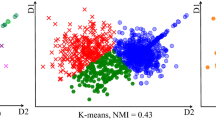Abstract
Despite being one of the most common approach in unsupervised data analysis, a very small literature exists on the formalization of clustering algorithms. This paper proposes a semiring-based methodology, named Feature-Cluster Algebra, which is applied to abstract the representation of a labeled tree structure representing a hierarchical categorical clustering algorithm, named CCTree. The elements of the feature-cluster algebra are called terms. We prove that a specific kind of a term, under some conditions, fully abstracts a labeled tree structure. The abstraction methodology maps the original problem to a new representation by removing unwanted details, which makes it simpler to handle. Moreover, we present a set of relations and functions on the algebraic structure to shape the requirements of a term to represent a CCTree structure. The proposed formal approach can be generalized to other categorical clustering (classification) algorithms in which features play key roles in specifying the clusters (classes).
This research has been supported by Natural Sciences and Engineering Research Council of Canada (NSERC).
Access this chapter
Tax calculation will be finalised at checkout
Purchases are for personal use only
Preview
Unable to display preview. Download preview PDF.
Similar content being viewed by others
References
Benavides, D., Segura, S., Ruiz-Cortés, A.: Automated analysis of feature models 20 years later: A literature review. Inf. Syst. 35(6), 615–636 (2010)
Berkhin, P.: A survey of clustering data mining techniques. In: Kogan, J., Nicholas, C., Teboulle, M. (eds.) Grouping Multidimensional Data, pp. 25–71. Springer, Heidelberg (2006)
Caruana, R., Niculescu-Mizil, A.: An empirical comparison of supervised learning algorithms. In: Proceedings of the 23rd International Conference on Machine Learning, ICML 2006, pp. 161–168. ACM, NY (2006)
Giunchiglia, F., Walsh, T.: A theory of abstraction. Artif. Intell. 57(2–3), 323–389 (1992)
Gross, J.L., Yellen, J.: Graph Theory and Its Applications. Discrete Mathematics and Its Applications, 2nd edn. Chapman & Hall/CRC (2005)
Hell, P., Nesetil, J.: Graphs and homomorphisms. Oxford lecture series in mathematics and its applications. Oxford University Press, Oxford, New York (2004)
Höfner, P., Khedri, R., Möller, B.: Feature algebra. In: Misra, J., Nipkow, T., Sekerinski, E. (eds.) FM 2006. LNCS, vol. 4085, pp. 300–315. Springer, Heidelberg (2006)
Höfner, P., Khédri, R., Möller, B.: An algebra of product families. Software and System Modeling 10(2), 161–182 (2011)
Kang, K.C., Kim, S., Lee, J., Kim, K., Shin, E., Huh, M.: Form: A feature-oriented reuse method with domain-specific reference architectures. Ann. Softw. Eng. 5, 143–168 (1998)
Panda, B., Herbach, J.S., Basu, S., Bayardo, R.J.: Planet: Massively parallel learning of tree ensembles with mapreduce. Proc. VLDB Endow. 2(2), 1426–1437 (2009)
Sheikhalishahi, M., Mejri, M., Tawbi, N.: Clustering spam emails into campaigns. In: Library, S.D. (ed.) 1st International Conference on Information Systems Security and Privacy (2015)
Sheikhalishahi, M., Saracino, A., Mejri, M., Tawbi, N., Martinelli, F.: Fast and effective clustering of spam emails based on structural similarity. In: Garcia-Alfaro, J., et al. (eds.) FPS 2015. LNCS, vol. 9482, pp. 195–211. Springer, Heidelberg (2016). doi:10.1007/978-3-319-30303-1_12
Author information
Authors and Affiliations
Corresponding author
Editor information
Editors and Affiliations
Rights and permissions
Copyright information
© 2016 Springer International Publishing Switzerland
About this paper
Cite this paper
Sheikhalishahi, M., Mejri, M., Tawbi, N. (2016). On the Abstraction of a Categorical Clustering Algorithm. In: Perner, P. (eds) Machine Learning and Data Mining in Pattern Recognition. MLDM 2016. Lecture Notes in Computer Science(), vol 9729. Springer, Cham. https://doi.org/10.1007/978-3-319-41920-6_51
Download citation
DOI: https://doi.org/10.1007/978-3-319-41920-6_51
Published:
Publisher Name: Springer, Cham
Print ISBN: 978-3-319-41919-0
Online ISBN: 978-3-319-41920-6
eBook Packages: Computer ScienceComputer Science (R0)




